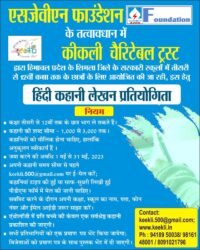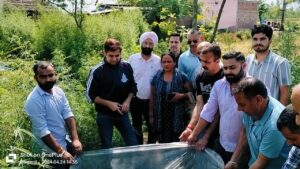GOI initiatives for Women Empowerment

Image Source Internet
Shimla, July 27 – The Government of India has taken various steps to ensure empowerment of women through their social, educational, economic and political uplifting through various schematic interventions. While the schemes implemented by the Government like Pradhan Mantri Awas Yojana (Urban & Rural), the National Social Assistance Programme (NSAP), the initiatives like Samagra Shiksha, Scheme of National Overseas Scholarship, Babu Jagjivan Ram Chhatrawas Yojna, Swacch Vidyalaya Mission, etc. ensure that schools are girl-friendly especially for vulnerable sections of society and have adequate facilities in place to fulfil their special requirements.
Further, the National Education Policy (NEP), 2020 prioritises gender equity and envisions ensuring equitable access to quality education to all students, with a special emphasis on Socially and Economically Disadvantaged Groups (SEDGs).
In order to enhance the employability of female workers, the Government is providing training to them through a network of Women Industrial Training Institutes, National Vocational Training Institutes and Regional Vocational Training Institutes. To ensure economic independence of women through skill development and vocational training, the Government has also introduced Skill India Mission. The National Skill Development Policy focuses on inclusive skill development, with the objective of increased women participation for better economic productivity. Pradhan Mantri Kaushal Vikas Kendras lay emphasis on creating additional infrastructure both for training and apprenticeship for women; flexible training delivery mechanisms, flexible afternoon batches on local need-based training to accommodate women; and ensuring safe and gender sensitive training environment, employment of women trainers, equity in remuneration, and complaint redressal mechanism. There are schemes like Pradhan Mantri Mudra Yojana and Stand Up India, Prime Minister’s Employment Generation Programme (PMEGP), for helping the women to set up their own enterprise. Pradhan Mantri Ujjwala Yojna (PMUY) aims to safeguard the health of women by providing them with clean cooking fuel and also reduce burden on them from drudgery of collecting firewood.
Further, in order to encourage employment of women, a number of enabling provisions have been incorporated in the recently enacted Labour Codes viz. the Code on Wages, 2019, the Industrial Relations Code, 2020, the Occupational Safety, Health and Working Conditions Code, 2020 and the Code on Social Security, 2020 for creating congenial work environment for women workers. The Mahatma Gandhi National Rural Employment Guarantee Act, 2005 (MGNREGA) mandates that at least one third of the jobs generated under the scheme (MGNREGS) should be given to women. Government has also made enabling provisions for allowing women’s participation in non-conventional sectors such as fighter pilots in Indian Air Force, Commandos, Central Police Forces, admissions in Sainik Schools, etc. The data in respect of these schemes are maintained by the respective Ministries/ Departments.
Further, the initiatives taken by the Ministry of Women and Child Development (MWCD) for empowerment of women and girls in the country during the last five years include following:
- POSHAN Abhiyaan
- Anganwadi Services Scheme
- Pradhan Mantri Matru Vandana Yojana (PMMVY)
- Beti Bachao Beti Padhao (BBBP) Scheme
- One Stop Centre (OSC)
- Universalisation of Women Helpline
- Child Protection Services Scheme
- Scheme for Adolescent Girls (SAG)
- Swadhar Greh Scheme
- Ujjawala Scheme
- Working Women Hostel
The above schemes have been included under the three newly launched Missions of the Ministry namely Mission Shakti, Mission Saksham Anganwadi & Poshan 2.0 and Mission Vatsalya with suitable modifications.
In addition, several projects/ schemes are implemented by Central Government through other Ministries / Departments /Implementing Agencies under Nirbhaya Fund which include Emergency Response Support System (ERSS) which is a pan-India single number (112)/ mobile app based system for emergencies; a cyber-crime reporting portal to report obscene content; Safe City Projects in 8 cities (Ahmedabad, Bengaluru, Chennai, Delhi, Hyderabad, Kolkata, Lucknow and Mumbai) including infrastructure, technology adoption and capacity building in community through awareness programmes, training and skill development programs for Investigation Officers, Prosecution Officers and Medical Officers; distribution of Sexual Assault Evidence Collection (SAEC) Kits to States/ UTs; establishment of State of Art DNA Laboratory at CFSL, Chandigarh; assistance to 24 States/ UTs to strengthen Forensic Science Laboratories; setting up of 1023 Fast Track Special Courts (FTSCs) including exclusive POCSO (e-POCSO) Courts for speedy disposal of cases of rape and cases under POCSO Act; setting up/ strengthening of Anti Human Trafficking Units (AHTUs) in all districts of the country; setting up/ strengthening of Women Help Desks (WHDs) at Police Stations etc. The Government has also put in place Investigation Tracking System for Sexual Offences, an online analytic tool for tracking and monitoring of investigation. A National Database of Sexual Offenders (NDSO) has also been created.
Under Nirbhaya Fund, Bureau of Police Research and Development (BPR&D) has undertaken several initiatives, which, inter-alia includes training and skill development programs for Investigation Officers, Prosecution Officers and Medical Officers, distribution of Sexual Assault Evidence Collection (SAEC) Kits to States/ UTs. BPR&D has also prepared Standard Operating Procedures (SoPs) for ‘Women Help Desk at Police Stations’ to ensure smooth functioning of Women Help Desks by focusing on four critical components viz. infrastructure, training, human resource development and response mechanism. A book titled ‘Women’s Safety and Security- a Handbook for First Responders and Investigators in the Police’ has also been prepared for the purpose of prevention and investigation of crime against women with specific reference to the crime of sexual assault, which includes investigation, victim compensation and rehabilitation. Emphasis has been laid upon appropriate behavioural and attitudinal skills of the police in course of prevention and detection of crime against women and children and interaction with victims of crime. Webinars on women safety with sensitivity, gender sensitization of police personnel etc. have also been organized by BPR&D.
Ministry of Women and Child Development has engaged the services of National Institute of Mental Health and Neuro Sciences (NIMHANS) for providing basic and advanced training under the project named ‘Stree Manoraksha’ to the staff of One Stop Centres (OSCs) across the country on handling psycho-social and mental health care needs to support the women facing violence and women in distress.
The outcome of the initiatives taken up by MWCD are (i) assistance to over 2.6 crore pregnant women and lactating mothers, (ii) improvement in Sex Ratio at Birth (SRB) from 918 to 937 and increased enrolment of girls in primary and secondary education which is almost at par with boys, (iii) operationalisation of 708 OSCs assisting 5.40 lakh women, (iv) operationalisation of WHL in 34 States / UTs that have handled over 70 lakh calls, (v) functionalisation of 107 Ujjawala homes having assisted 6175 number of inmates, (vi) functionalisation of 367 Swadhar Greh having assisted 17291 number of inmates, (vii) functionalisation of 450 Working Women Hostels having assisted 74666 working women and 11018 children in day care centre, and (viii) implementation of gender budgeting in 41 Ministries / Departments with reported allocation of Rs. 1.71 lakh crore for the financial year 2022-23.
The positive outcomes of the above initiatives taken by the Government can be seen from the data of National Family Health Survey – 5 (NFHS-5) which shows that the status of women has improved over the past 5 years (as compared to NFHS-4) on many counts. Today, over 78.6% of women own bank accounts that they themselves use, which is an improvement by 25% over last 5 years. This implies that 3 out of 4 women own bank accounts that they themselves use. Today, 54% women or 1 out of 2 women in India own mobile phones that they themselves use in comparison to 46% five years back. 43% women in India today own either a house or land alone or jointly which was 38% five years ago. NFHS-5 data shows improvement in sex-ratio. 1 out of 5 non-farm businesses are headed and led by women today.
Increasingly our society is transforming where men respect women’s opinions as partners in the household. More women participate in major household decisions today. NFHS-5 data shows that 88.7% women participate in major household decisions today as against 84% five years ago. The incidence of spousal violence has reduced considerably in the past ten years. NFHS-5 data shows that 29% married women report experiencing spousal violence as compared to 39% 10 years ago and 33% five years ago.
The third party assessment/ evaluation of the initiatives of MWCD was done by NITI Aayog in 2020. Based on the experience of implementing the initiatives/ schemes and after consideration of the recommendations of the evaluation study, the Ministry has launched ‘Mission Shakti’ – an integrated women empowerment programme as umbrella scheme by converging various sub-schemes relating to safety, security and empowerment of women for greater efficiency, effectiveness and financial prudence. Accordingly, Ministry has issued guidelines of ‘Mission Shakti’ on 14.07.2022.





